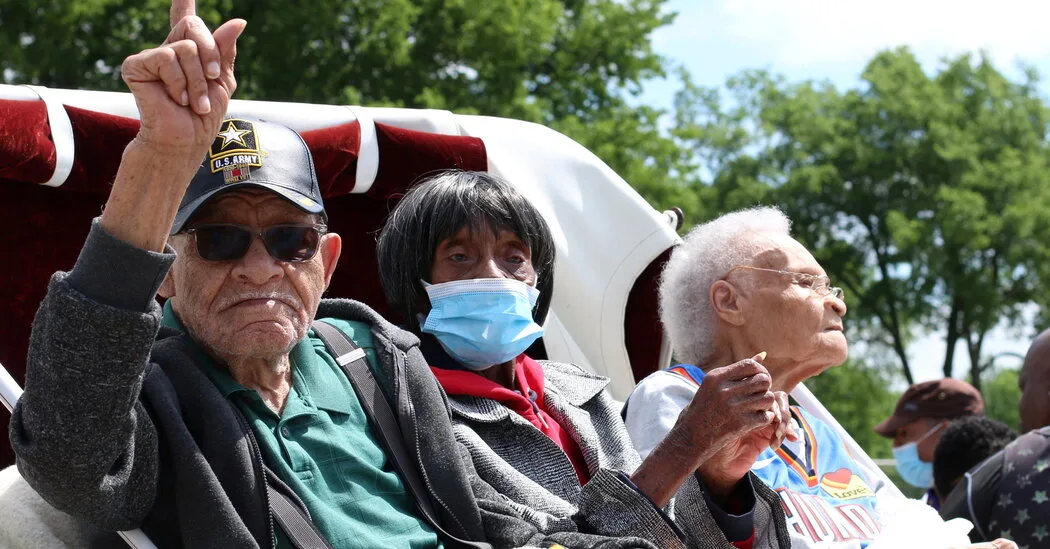
A lower court dismissed a lawsuit filed by the three living survivors of one of the worst acts of racial violence in American history. The Oklahoma Supreme Court has now agreed to hear an appeal.
The legal fight over reparations for the 1921 massacre of Black residents in Tulsa, Okla., will continue, after the Oklahoma Supreme Court agreed to hear an appeal of a lower court’s dismissal of a lawsuit filed by the attack’s last three living survivors.
The lawsuit, filed in 2020, includes the city, the Tulsa County sheriff, county commissioners and the Oklahoma Military Department, which administers the Oklahoma Army and Air National Guard, as defendants. A Tulsa County district judge dismissed it in July, and the state’s high court agreed last week to hear an appeal.
“It is a huge victory for us,” Damario Solomon-Simmons, a lawyer for the plaintiffs, said in an interview on Tuesday. “It allows us to move the case along as quickly as possible.”
The three plaintiffs are all over 100 years old: Viola Fletcher, 109, Hughes Van Ellis Sr., 102, and Lessie Benningfield Randle, 108. Ms. Benningfield Randle said she still has flashbacks of corpses being stacked on the street as her neighborhood burned, according to the lawsuit.
The suit, filed under the state’s public nuisance law, claims that the devastation caused by the massacre continues to affect the community.
“We believe we should have a right to go to trial because we can prove that the nuisance is still continuing,” said Mr. Solomon-Simmons. He compared the massacre to an oil spill: “That oil is still in the water, it’s still polluting the water.”
The massacre occurred on May 31, 1921, when a white mob gathered outside a courthouse where a young Black man was being held over allegations that he had attacked a young white woman. The man was cleared, but when the group of white men converged with a group of Black men at a police station, shots were fired and a fight broke out.
The mob descended on Greenwood, a thriving neighborhood in Tulsa known as Black Wall Street, and burned it to the ground, aided by the National Guard. The death toll may have been as high as 300, making it one of the worst acts of racial violence in American history. Hundreds more were injured, and an estimated 8,000 or more were left homeless.
After the massacre, officials worked to erase it from the city’s historical record, and none of the survivors or their families ever received any compensation from state or city officials.
Kevin McClure, an assistant attorney general for Oklahoma, wrote in response to the appeal that the survivor’s “allegations are premised on conflicting historical facts from over 100 years ago” and that “they have failed to properly allege how the Oklahoma Military Department created (or continues to be responsible for) an ongoing ‘public nuisance.’”
Mr. Solomon-Simmons said the plaintiffs cited events that were supported by the city’s commissioned report from 2001, and he underscored that 1,500 homes and businesses were destroyed and never rebuilt. “For that in and of itself, a trial must happen here,” he said.
In July, a district court judge, Caroline Wall, who had ruled the case could proceed in May 2022, dismissed the case with prejudice, as the city had requested.
In a motion, lawyers for the city argued that “simply being connected to a historical event does not provide a person with unlimited rights to seek compensation from any project in any way related to that historical event.”
Michelle Brooks, a city spokeswoman, said on Tuesday that the city would not comment on pending litigation.
In the appeal filed earlier this month, the plaintiffs asked for the “opportunity — before they die and there are no other survivors of the Massacre — to take the stand, take an oath, and tell an Oklahoma court what has happened to them, their families and their community.”
The state’s Supreme Court will determine whether the case should be sent back to the district court for a trial. That the decision to consider the appeal came so swiftly after filing it, Mr. Solomon-Simmons said, gave the survivors “a lot of inspiration and a lot of hope.”

